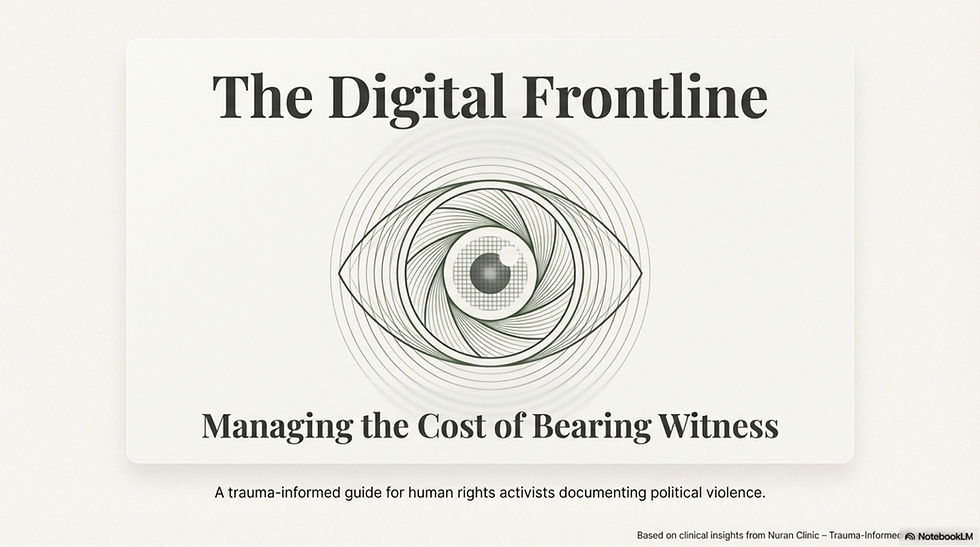Understanding Domestic Violence, Assault, and Support Resources for Refugees and Newcomers
- Mahyar Zaud

- May 8, 2025
- 3 min read
Updated: Jul 24, 2025

At Nuran Clinic, we are committed to providing high-quality psychotherapy services to all Canadians, including refugees and asylum seekers who have come to Canada seeking safety and a better life. Our experienced, trauma-informed clinicians understand the unique challenges faced by newcomers and offer compassionate, culturally sensitive care.
One of the issues we often encounter is a lack of understanding around what constitutes domestic violence and assault in Ontario, especially among newcomers. This misunderstanding can lead to serious consequences, including police involvement and child protection investigations.
What Is Domestic Violence?
Domestic violence refers to abuse that occurs within a family or intimate relationship. It can include:
Spouses or partners (married, common-law, or dating)
Parents and children
Siblings or other family members
Domestic violence includes not just physical harm but also emotional, verbal, psychological, sexual, and financial abuse.
What Is Considered Assault in Ontario?
The following actions may result in police intervention and criminal charges, even if you did not intend to cause harm:
Physical Restraint:
Holding someone’s hands or body to stop them from moving
Blocking a doorway or exit
Even if your partner is physically aggressive toward you, restraining them can still be considered assault
Throwing Objects:
Throwing anything at your partner or children (e.g., phones, water, utensils) is assault
Throwing objects near someone to scare or intimidate them (e.g., smashing a phone on the floor) is also assault
Physical Aggression:
Hitting, slapping, pushing, choking, biting, tying someone up, or applying pressure to someone’s body
Emotional Intimidation:
Threatening to harm someone
Yelling in a threatening manner or causing someone to feel unsafe
Sexual Assault:
Any non-consensual sexual act
Forcible Confinement:
Preventing someone from leaving a room or house
Criminal Harassment:
Repeated unwanted calls, texts, following, or watching someone
Mischief:
Damaging or destroying property (e.g., breaking a phone, punching walls)
Involving the Police
If police are called and a child under 16 is present during a domestic violence incident, Children’s Aid Society (CAS)will be informed. Many parents worry that CAS will take their children away. While this is possible in very serious situations, CAS's goal is to keep children safe, not to punish parents.
If one parent is capable of caring for the child, the child will usually remain in their custody.
Children are only removed if both parents are deemed unable to provide a safe environment.
Time-Out: A Tool for Preventing Violence
To prevent situations from escalating into violence:
Agree with your partner on using a "time-out" strategy.
When either person feels overwhelmed or triggered, they should calmly state that they need time out.
Leave the environment (10 minutes, an hour, even a full day if needed) to cool down.
Agree on a time to come back and resume the conversation.
If things get heated again, take another time out. Repeat as necessary.
Important: Time-out is not a way to avoid responsibility or dismiss the other person. It’s a tool to protect your relationship and safety.
Why Getting Help Matters
If you are in an abusive situation, please seek help immediately.
If you feel you cannot control your anger, get support before it escalates.
Domestic violence creates long-lasting harm, especially to children.
Support Resources
Emergency Police Line: 911 (If you or someone is in immediate danger)
Assaulted Women’s Helpline: 1-866-863-0511
Kids Help Phone: 1-800-668-6868 or text CONNECT to 686868
211 Ontario: Dial 2-1-1 for local community services and support in multiple languages
Nuran Clinic: 647-618-9080 | admin@nuranclinic.com
If you or someone you know is dealing with issues of domestic violence, do not hesitate to contact us for consolation. In case of emergency contact the police line: 911. Our clinic is here to support you confidentially and respectfully.
Let’s work together to build safer homes, stronger relationships, and healthier communities.



Comments